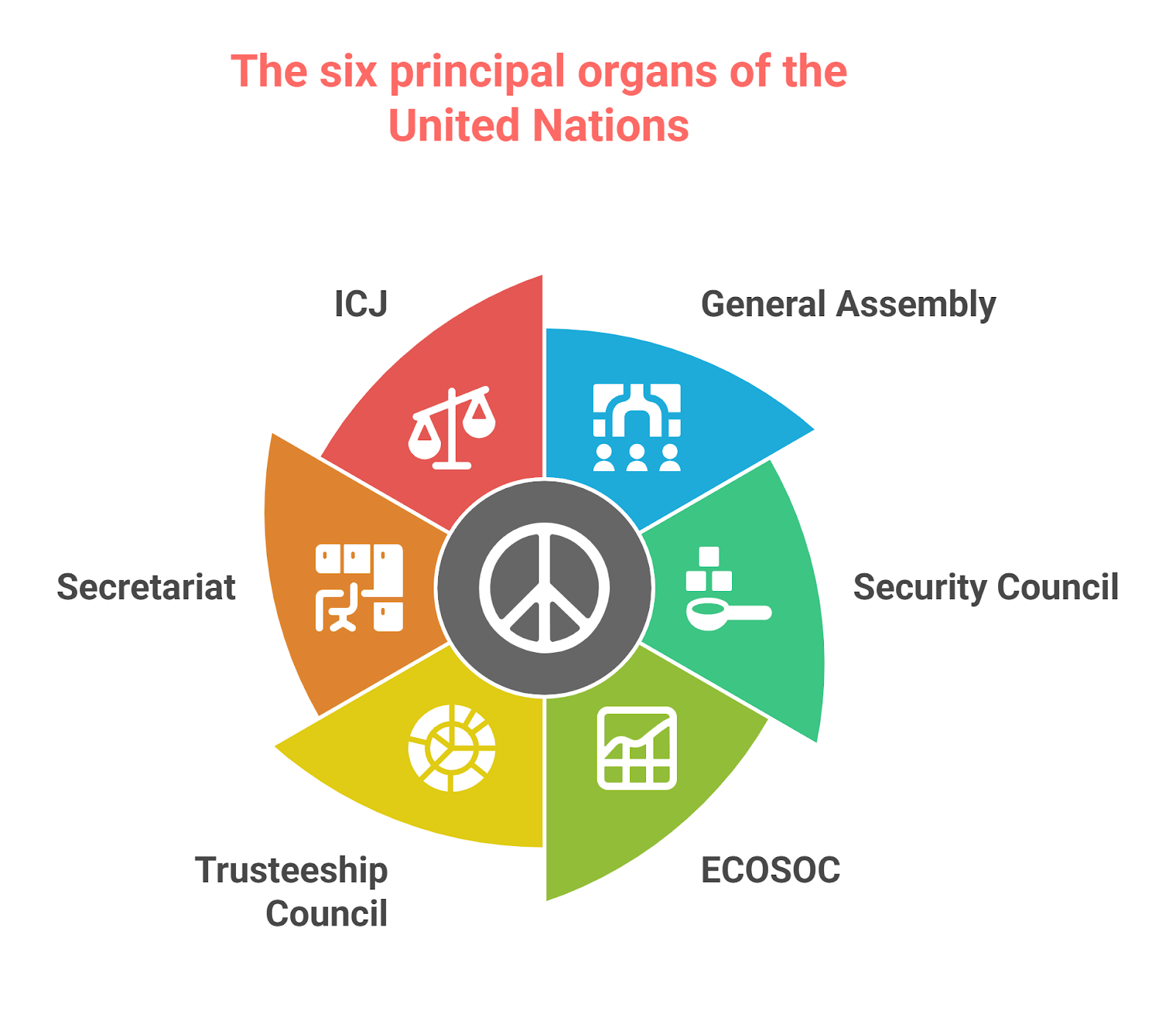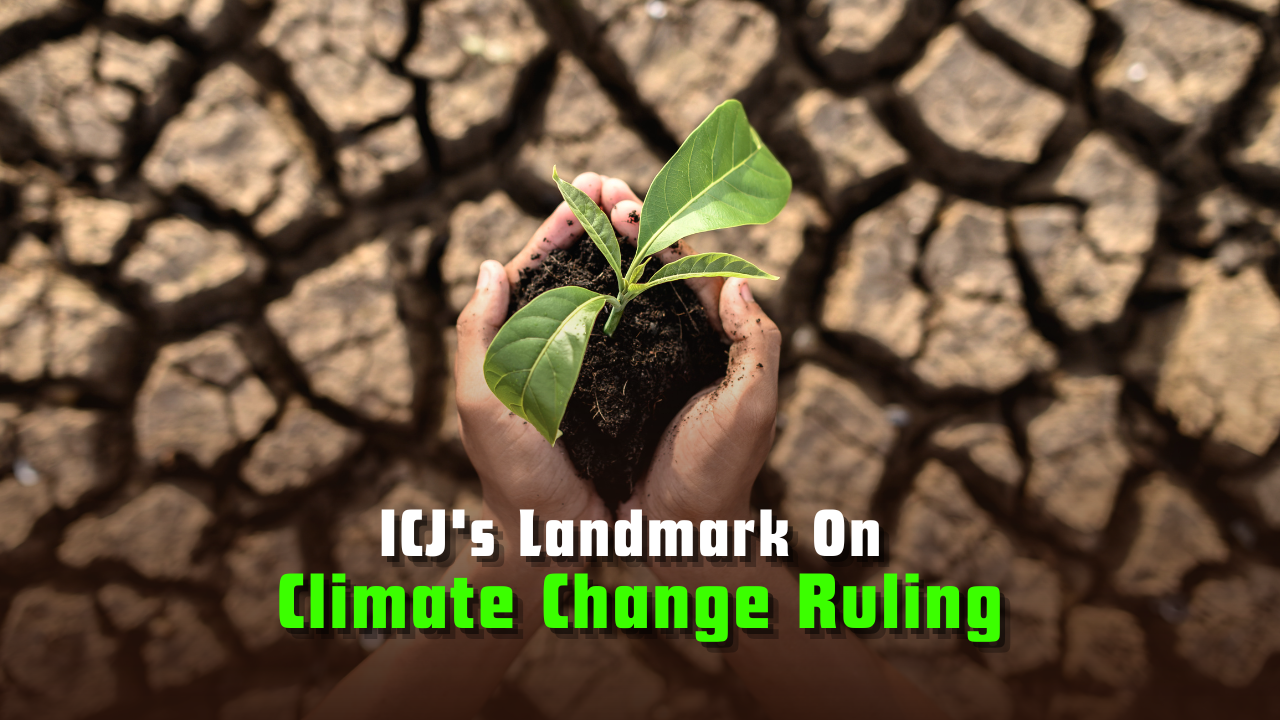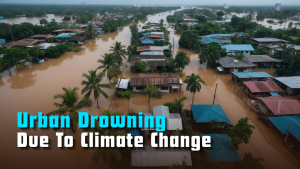Font size:
Print
ICJ’s Landmark Climate Change Ruling
Why ICJ ruling on climate change is significant
Context: In a historic move, the International Court of Justice (ICJ) has issued its first-ever advisory opinion on climate change, declaring that climate protection is a legal obligation under international law.
Background
- Initiated by: Pacific Island Students Fighting Climate Change (PISFCC) and Vanuatu (2019).
- The ICJ ruling follows a March 2022 UN General Assembly resolution, which sought the court’s opinion on:
- The legal obligations of States in protecting the climate system.
- The legal consequences of failing to meet these obligations.
- Participation: 97 countries and 11 international organisations submitted arguments — the largest advisory case in ICJ history.
- The court examined major climate treaties such as the UNFCCC, Kyoto Protocol, and Paris Agreement, along with other related treaties like the Montreal Protocol, Convention on Biodiversity, UNCLOS, and Convention to Combat Desertification.
International Court of Justice (ICJ)
- The International Court of Justice (ICJ), often referred to as the “World Court”, is the principal judicial organ of the United Nations (UN).
- Established in 1945 under the UN Charter, it plays a crucial role in maintaining international peace and security by settling legal disputes between States and offering advisory opinions on complex legal issues referred by authorised UN bodies.
- The ICJ is located at the Peace Palace in The Hague, Netherlands.
- It is the only one among the six principal UN organs not headquartered in New York.

- Composed of 15 judges, each elected for a 9-year term by the UN General Assembly and Security Council, voting independently.
Key Highlights of the ICJ Ruling
- Climate Action = Legal Duty: Climate action is not optional or merely a policy choice. It is a legal obligation under international law. Countries must undertake measurable efforts to reduce greenhouse gas emissions (GHGs).
- Enhanced Responsibility of Developed Countries: Nations listed under Annexure I of the UNFCCC (industrialised countries) must: Take the lead in emissions reductions. Facilitate technology transfer and financial assistance to developing countries.
- Liability for Non-Compliance: Failure to meet obligations can be considered an “internationally wrongful act”. This may lead to Legal liability in courts, and Compensation or full reparation to “injured states” suffering from climate disasters. Even private sector emissions may invoke state liability if regulatory due diligence is lacking.
Significance for the Global Climate Movement
- Legal Empowerment of Developing Nations: The ruling strengthens the voice of vulnerable and developing countries in demanding climate justice and adherence to Loss and Damage mechanisms.
- Global Precedent for Litigation: While the ICJ’s opinion is non-binding, it is the most authoritative interpretation of climate-related international law. Courts across the globe may cite this opinion in:
-
-
- Climate compensation lawsuits,
- Suits against corporate polluters,
- National enforcement of climate treaties.
-
- Focus on “Sufficiency” of Climate Action: The ICJ ruled that mere participation or minimal effort is not enough. Climate action is open to judicial scrutiny based on its scale and effectiveness. This potentially challenges the Paris Agreement’s “self-determined” climate pledges, which lack binding enforcement mechanisms.
Criticisms and Challenges
- The ruling clashes with the voluntary nature of the Paris Agreement, where countries set their own targets and progression paths.
- Implementation hurdles exist, especially in quantifying liability, evaluating sufficiency, and enforcing reparations.
- Developed nations are expected to contest the opinion, especially around legal liability and reparations.
Implications for India and the Global South
- The ruling bolsters India’s and other developing nations’ calls for: Climate equity, Differentiated responsibilities, and Technology and finance transfer from the Global North.
- It provides legal leverage in international forums like COP and G20.
- It may aid in pressuring multinational corporations operating in India to reduce emissions and comply with regulatory standards.
Subscribe to our Youtube Channel for more Valuable Content – TheStudyias
Download the App to Subscribe to our Courses – Thestudyias
The Source’s Authority and Ownership of the Article is Claimed By THE STUDY IAS BY MANIKANT SINGH



